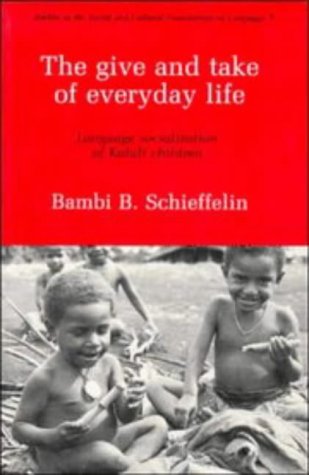Verwandte Artikel zu The Give and Take of Everyday Life: Language, Socialization...
The Give and Take of Everyday Life: Language, Socialization of Kaluli Children (Studies in the Social and Cultural Foundations of Language, Series Number 9) - Softcover

Inhaltsangabe
In this study of language socialization among the Kaluli people of Papua New Guinea, Bambi B. Schieffelin examines the everyday speech activities between children and members of their families, linking them to other social practices and symbolic forms such as exchange systems, gender roles, sibling relationships, rituals and myths. In Kaluli society, as in many others in Papua New Guinea, reciprocity plays a primary role in social life. In families, social relationships are constituted through giving and sharing food. Children, however, are also socialized through language to refuse to share, creating a tension in daily interactions. Issues of authority, autonomy and interdependence are negotiated through these verbal exchanges. Schieffelin demonstrates how language plays a fundamental role in the production, meaning and interpretation of these activities, as it is the medium of social practice. Through the micro-analysis of social interactions, Schieffelin shows how values regarding reciprocity, gender relations and language itself are indexed and socialized in everyday talk to children, and how children's own ways of speaking express fundamental cultural concerns about their social relationships.
Die Inhaltsangabe kann sich auf eine andere Ausgabe dieses Titels beziehen.
Críticas
"The Give and Take of Everyday Life represents a seminal contribution to the field of linguistic anthropology...the author presents her material along exceptionally human lines: scenes and settings, individuals and relationships, emotions and thoughts, live on the page, giving us a unique glimpse of the everyday life and underlying patterns of a comunity." Kate Riley, Anthropological Linguistics
Reseña del editor
In this study of language socialization among the Kaluli people of Papua New Guinea, Bambi B. Schieffelin examines the everyday speech activities between children and members of their families, linking them to other social practices and symbolic forms such as exchange systems, gender roles, sibling relationships, rituals and myths. In Kaluli society, as in many others in Papua New Guinea, reciprocity plays a primary role in social life. In families, social relationships are constituted through giving and sharing food. Children, however, are also socialized through language to refuse to share, creating a tension in daily interactions. Issues of authority, autonomy and interdependence are negotiated through these verbal exchanges. Schieffelin demonstrates how language plays a fundamental role in the production, meaning and interpretation of these activities, as it is the medium of social practice. Through the micro-analysis of social interactions, Schieffelin shows how values regarding reciprocity, gender relations and language itself are indexed and socialized in everyday talk to children, and how children's own ways of speaking express fundamental cultural concerns about their social relationships.
„Über diesen Titel“ kann sich auf eine andere Ausgabe dieses Titels beziehen.
Gratis für den Versand innerhalb von/der USA
Versandziele, Kosten & DauerSuchergebnisse für The Give and Take of Everyday Life: Language, Socialization...
The Give and Take of Everyday Life: Language, Socialization of Kaluli Children (Studies in the Social and Cultural Foundations of Language)
Anbieter: Wonder Book, Frederick, MD, USA
Zustand: Good. Good condition. A copy that has been read but remains intact. May contain markings such as bookplates, stamps, limited notes and highlighting, or a few light stains. Artikel-Nr. K09A-04176
Anzahl: 1 verfügbar
The Give and Take of Everyday Life: Language, Socialization of Kaluli Children (Studies in the Social and Cultural Foundations of Language, Series Number 9)
Anbieter: ThriftBooks-Atlanta, AUSTELL, GA, USA
Paperback. Zustand: Very Good. No Jacket. May have limited writing in cover pages. Pages are unmarked. ~ ThriftBooks: Read More, Spend Less 0.92. Artikel-Nr. G0521386543I4N00
Anzahl: 1 verfügbar
The Give and Take of Everyday Life : Language, Socialization of Kaluli Children
Anbieter: Better World Books, Mishawaka, IN, USA
Zustand: Good. Used book that is in clean, average condition without any missing pages. Artikel-Nr. 6252682-6
Anzahl: 1 verfügbar
The Give & Take Of Everyday Life: Language Socialization Of Kaluli Children
Anbieter: THE CROSS Art + Books, Sydney, NSW, Australien
23.0 x 15.0cms 278pp very good paperback & cover This book analyses the Kalulis'' speech activities and links them to other social practices anmd symbolic forms such as exchange systems gender roles sibling relationships rituals and myths. Artikel-Nr. 20819958
Anzahl: 1 verfügbar
The give and take of everyday life. Language socialization of Kaluli children. 1. Aufl.
Anbieter: Antiquariat Held, Stuttgart, Deutschland
Mit 1 Karte, 1 Nebenkarte, 1 Plan, 2 Grundrissen, 28 Abb. u. 2 Diagrammen. 1 Bl., VIII, 278 S. Gr. 8°. Illustr. OBrosch., diese tls. schwach angerändert u. unwesentlich geknickt, sonst gutes Exemplar. (410 Gr.) - Studies in the Social and Cultural Foundations of Language, 9. Sprache: englisch. Artikel-Nr. 16674AB
Anzahl: 1 verfügbar

